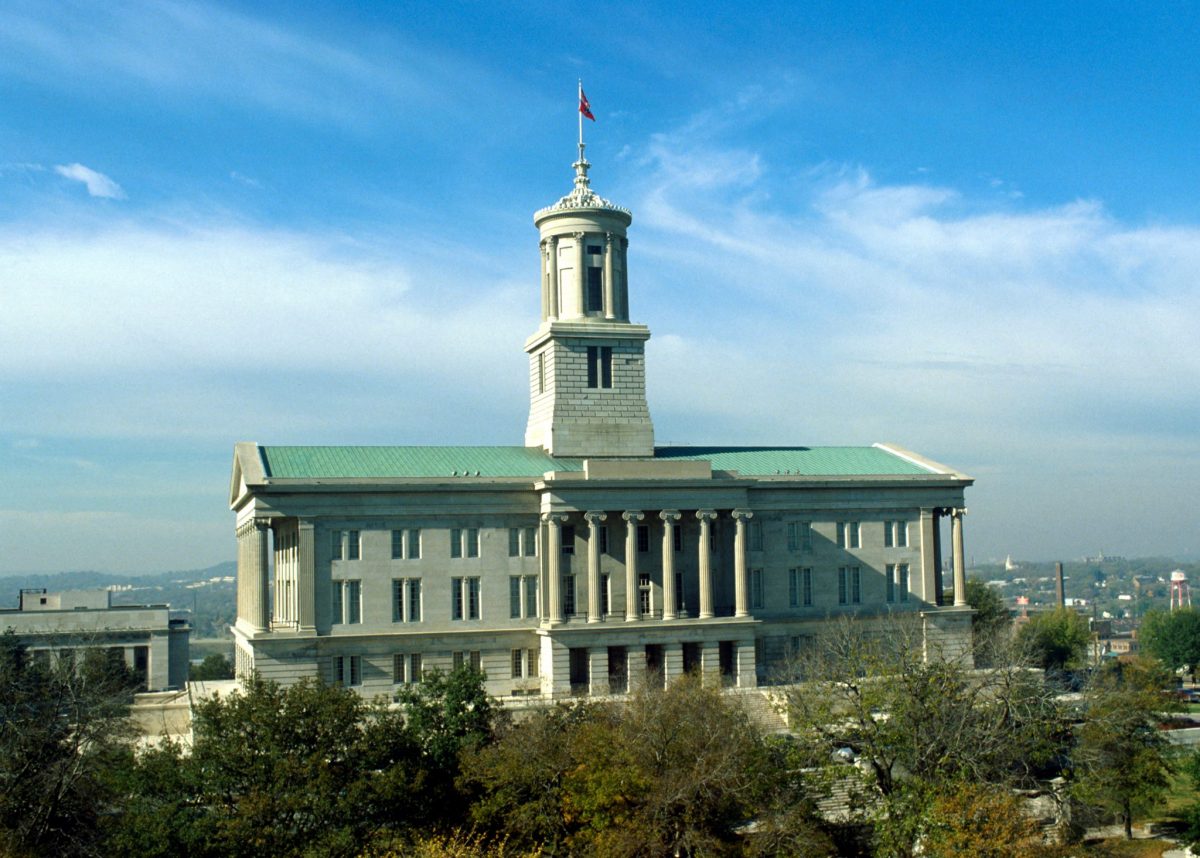Tennessee lawmakers’ scrutiny of public education this year ran the gamut, from completely rewriting the state’s K-12 funding formula to authorizing teachers to confiscate students’ cell phones if they’re deemed a distraction in class.
The 65 or so education bills that ultimately passed during the 2022 session showed lawmakers were willing to not only undertake big, systemic reforms, but also to assert state power over issues traditionally handled at the local or school level. Among them: which books are OK for libraries and how to resolve a dispute between two cities over school properties.
All measures ultimately will affect students in pre-K through 12th grade, their educators, and schools — most beginning this fall.
They include several anticipated new laws aimed at addressing the state’s teacher shortage by loosening restrictions on licensing, plus another bill that expands Tennessee’s private school voucher program for students with disabilities to include those with dyslexia.
And one year after a 2021 law restricted how race and bias can be taught in schools, new legislation requires schools to infuse multiculturalism throughout the K-12 curriculum, with special attention to Black history in grades 5 through 8.
The legislature’s focus on culture war issues was notable, from scrutinizing content in school libraries to pulling state funding from schools that allow transgender youth to participate in girls sports.
Also notable were the proposals that didn’t pass.
Pushback from advocates of traditional public schools helped to sideline bills that likely would have led to significant expansion of the state’s charter school sector. One measure, which was resurrected after stalling last year, would have opened the door to for-profit charters in Tennessee. Another would have let charter organizations bypass local districts and apply for authorization directly to the state’s new charter commission.
Lawmakers struck down a perennial bill to allow school superintendents to be elected by voters instead of being appointed by school boards, albeit by a closer margin than in previous years.
Also scuttled were bills that would limit which supplemental materials that teachers can use, ban corporal punishment in schools, and require that state tests be given only during the last 20 days of the school year.
Still, the GOP supermajority saw many of its bills head to Gov. Bill Lee for his signature.
After the final gavel fell on April 28, Lee touted the passage of his legislative agenda as “America at its best,” including the funding rewrite that he signed into law this week, a $500 million one-time investment in middle and high school career and technical education, and a $125 million increase toward teacher pay.
House Minority Leader Karen Camper, however, characterized this year’s session as one of “missed opportunities.” Citing the state’s historic revenue surplus and billions of dollars in one-time federal COVID relief funding, the Memphis Democrat said the state could have invested even more in education, as well as health care, housing, and other needs critical to the average Tennessean.
Here is a roundup of some of the 2022 bills that passed:
Tennessee Investment in Student Achievement (HB2143-SB2396): The so-called TISA formula will replace the state’s 30-year-old funding system. It sets a base funding rate of $6,860 per pupil, then distributes additional funding for students who are considered economically disadvantaged, have unique learning needs, or live in communities that are rural or have concentrated poverty. The governor, who is running for reelection, pledged to inject an extra $1 billion annually into the base and weights when the formula kicks in beginning in 2023-24.
Budget (HB2882-SB2897): The state’s $53 billion spending plan includes a $125 million recurring funding increase toward teacher salaries and a one-time $500 million investment in career and technical education for middle and high schools. But legislative finance leaders stripped away $200 million that Lee wanted for relocating 14 Tennessee schools built in floodplains. The budget also sets aside $32 million to help charter schools pay for facilities. And it includes about $29 million to launch Tennessee’s paused school voucher program, just in case the Tennessee Supreme Court overrules a lower court’s 2020 ruling that it is unconstitutional.
Age-Appropriate Materials Act (HB2154-SB2407): The governor’s plan requires each school library to publish the list of materials in their collections and periodically review them to make sure they are “appropriate for the age and maturity levels of the students who may access the materials.” It also requires school boards to establish processes for receiving feedback and removing books that don’t meet that standard, which is to be defined by each district based on local community standards.
New appellate process (HB2666-SB2247): Tennessee’s textbook commission can overrule local school board decisions and ban certain school library books statewide if they are deemed “inappropriate for the age or maturity levels” of students who can access them. Under legislation approved on the final day of the session, which Lee has said he’ll sign, the politically appointed panel can hear appeals from parents, school employees, or other complainants on the decisions of locally elected officials over challenged materials.
Tennessee library coordinator (HB1667-SB1784): Creates a position at the state education department to strengthen school library programs and promote best practices among librarians and technology coordinators. The Tennessee Association of School Librarians lobbied for the position.
Black history (HB2106-SB2501): Requires, rather than recommends, instruction on Black history in schools. Schools must infuse multiculturalism throughout the K-12 curriculum, with special attention to Black history in grades five through eight. The bill takes effect in 2025-26 to align with a scheduled review of the state’s social studies standards.
Virtues of capitalism (HB2742-SB2748): Requires instruction on the “virtues of capitalism and the constitutional republic form of government in the United States and Tennessee, as compared to other political and economic systems such as communism and socialism.”
Grading scale (HB0324-SB0388): Returns Tennessee to a 10-point grading scale for high school students instead of a seven-point scale for assigning A-F letter grades, to help with post-secondary financial assistance. So instead of a 93-100 average to receive an A, the range would be 91-100. The shift, which has been discussed in the legislature for several years, would align Tennessee’s high school grading scale with its colleges and universities. The primary goal is to put Tennessee students on an even playing field with their peers elsewhere, including eight bordering states.
Hope scholarships (HB2152-SB2405): Lawmakers approved the largest increase for HOPE scholarships for academic achievers at public four-year universities in Tennessee since the scholarships launched in 2004. Beginning with the 2022-23 academic year, the awards will increase from $3,500 to $4,500 for full-time eligible freshmen and sophomores and from $4,500 to $5,700 for juniors and seniors. Funded from the net proceeds of the Tennessee Lottery, the program aids students who graduate from a Tennessee high school with a 3.0 GPA or higher and score at least 21 on their ACT or 1060 on their SAT.
‘Divisive concepts’ in higher education (HB2670-SB2290): Gives public university students the right to sue professors if they believe they received low grades based on politics or ideology.
Transgender athletes (HB1895-SB1861): Legislation signed by the governor requires the state education department to withhold funds from schools that don’t identify athletes’ genders assigned at birth or that allow transgender girls to play on girls’ sports teams. A second bill prohibits trans women from playing on women’s college sports teams.
But legislation stalled that would have shielded schools from recourse if a teacher disregards the preferred pronouns of students. And lawmakers scuttled another bill that would have banned “textbooks and instructional materials or supplemental instructional materials that promote, normalize, support or address lesbian, gay, bi-sexual or transgender issues or lifestyles.”
Expansion of vouchers for students with disabilities (HB0751-SB1158): Under a bill that the governor is expected to sign, nearly 35,000 students with learning disabilities such as dyslexia would be eligible to participate in Tennessee’s private school voucher program for students with disabilities. The legislation would almost double the number of students now eligible to receive state money to pay for private education services through the state’s 6-year-old Individualized Education Account program. Currently, that program serves 284 students with disabilities that include autism, hearing and vision impairments, and traumatic brain injury. State officials estimate the families of about 250 students would opt to participate and receive an average of $7,811 annually during the first year. Such an expansion would shift more than $2 million in state funding from public to private schools and vendors.
Temporary teaching permits (HB1901-SB1863): Extends for another two years temporary teaching permits to teach certain courses and subjects where vacancies are hard to fill.
Limited license pathway (HB1899-SB1864): Allows teachers holding a temporary teaching permit to apply to the state for a practitioner’s license before the permit expires.
Retired teachers and bus drivers (HB2783-SB2702): Through 2025, retired teachers and bus drivers could be reemployed as a teacher, substitute teacher, or bus driver, without having their retirement benefits taken away or suspended. Currently, retired teachers can return to work, but only for 120 days maximum. The change would allow workers to return for an entire school year if there are no other qualified applicants. During reemployment in a school system, retirement benefits would be reduced to 70% of retirement allowance, and the existing salary cap would be removed.
Occupational teaching licenses (HB2455-SB2442): Amends qualifications necessary to receive an occupational teaching license to address the shortage of instructors for vocational and career and technical education programs.
Transfer of schools to Germantown (HB2430-SB2315): Memphis school officials will have to transfer three suburban schools to neighboring Germantown under heavily amended legislation that gives both parties until next year to reach an agreement. Germantown officials have sought the expensive properties for a decade, but leaders of Memphis-Shelby County Schools countered that they offered no long-term plan for educating the 3,300 students who would be affected, most of whom live near Germantown in unincorporated parts of Shelby County. A federal judge approved the original 2013 agreement that transferred five of eight Germantown schools from the Memphis district to the Germantown school system. Memphis leaders have said they may take the matter back to court.
Marta W. Aldrich is a senior correspondent and covers the statehouse for Chalkbeat Tennessee. Contact her at maldrich@chalkbeat.org.
Chalkbeat is a nonprofit news site covering educational change in public schools.









